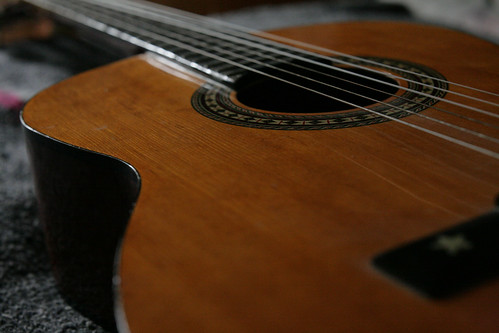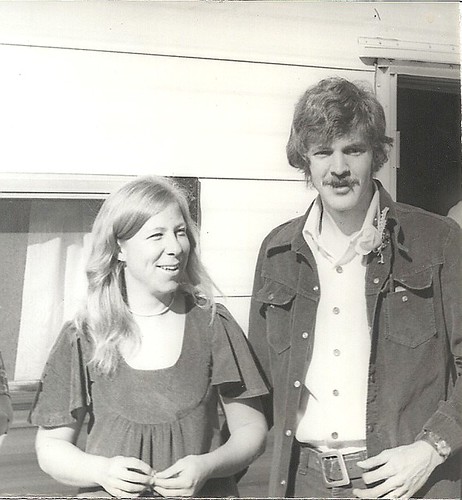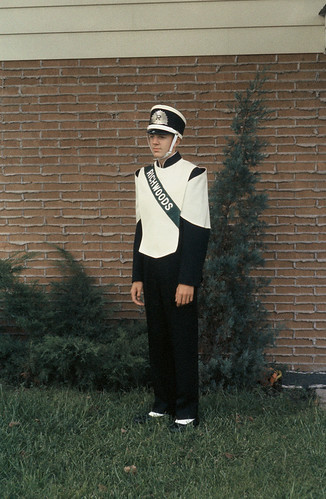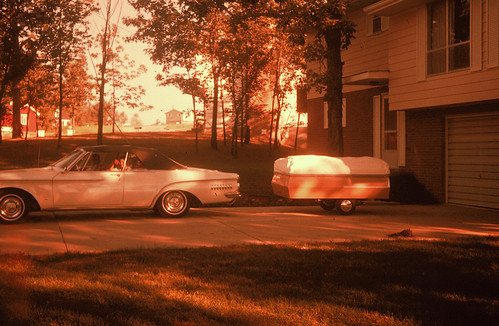
For a guy who was afraid to call a stranger on the phone, playing guitar and singing to an audience might seem an unlikely choice of a hobby, but I was drawn to it. I couldn’t have made a speech in front of even a moderate sized group of people, but I could play my guitar and sing to them. At first I would close my eyes so that I didn’t have to make eye contact with anyone in the audience, but eventually I was able to sing and play and look at the crowd all at the same time. After some years of practice, I acquired enough skill as a vocalist to become the lead singer in a band of my own. Don’t get the idea that I was any less of a social pariah as a musician, though, and I was still completely hopeless as any sort of public speaker, or at any other sort of extemporaneous banter in front of anyone except for my friends. It’s called “stage fright” and I had it. I was afraid of looking foolish and being ridiculed by the audience. With good reason, I suppose, for in the beginning I was not very good at either singing or playing.
I took up the guitar when I was fifteen years old. It had been my dad’s guitar, but he wasn’t playing it so I decided to give it a try. I bought some song books that featured chord charts above the music and began learning chords. I practiced for hours alone in my room. Sometimes I would play one of the songs I was learning for my girlfriend while we were on the phone together. Once I got the chording and strumming more or less under control, I added singing. There was no stopping me now. Every place where it was even remotely acceptable for me to play and sing, there I would be. When I would play in public either people were too polite to tell me I was awful, or perhaps I was not as bad as I thought I was. With a bit of encouragement, I took the few chords I knew and started writing songs with them. I knew the songs weren’t very good, but I sang them anyway. I wrote love songs for my girlfriend and I wrote Christian songs for my Young Life friends.
I don’t remember how I got involved with Young Life. It was a group of Christian high school students who met once a week and sang songs about God and Jesus and got a sort of sermon from one of the adult leaders. We were encouraged to pray a lot and share our experiences and realizations about our faith. For me, it was a great venue for my playing and singing, so I wrote some songs just for that group. I was the only one doing anything like that, so I was asked to perform on a regular basis. I was happy to do so, since I had a captive audience comprised of people mostly too polite to tell me to stop.
Some of my high school band acquaintances were working on putting together a rock-and-roll band and I was invited to sing with them. I was thrilled. If anything would make me popular with my peers, singing in a rock-and-roll band should certainly be that thing. It wasn’t, or course, but it was fun in a scary sort of fashion. I was still terrified of getting up in front of a crowd and making a fool of myself. To prevent that, I spent most of my time in classes writing out, over and over again, the lyrics to the songs I was to sing. The band played a couple of high school dances and a private party, but it was not to last. The rest of the guys in the group were a couple of notches above me in the social strata and I was just not what they were looking for in a lead singer. They told me that I was singing flat and that I was out of the band. The real problem was that I couldn’t afford the kind of equipment that I needed to keep up with the rest of the more affluent group members. My singing was fine; my financial and social status was not. I’d had a taste of the rock-and-roll life, though, and I wasn’t about to give up my playing and singing. I would just have to find a way to do it on my own.
That’s been the one constant theme in my life: Find a way to do it myself. Since I was a complete social reject, I had no choice but to find ways to do things using only my own resources. If there is a way to do it myself, I will find it. It’s become a philosophy for me. I’ve applied it to home repairs, computers, automobiles, photography, education, music and anywhere else I can. You can immediately see the basic flaw in this philosophy; it tends to leave one doing everything alone. Everything. This philosophy automatically excludes any sort of team effort, and it completely bypasses the “many hands make for light work” maxim. On the other hand, it does make one independent of mechanics, repairmen, teachers and schools. A couple of things you do need, though, are authors and tools. If you can read and follow instructions, then you can fix almost anything. And if you have and know how to use tools, fixing things can be rather easy. With the right tools, you can do a great many things by yourself. With the right tools, I would eventually become a one-man band.
At the end of my-first-and-only-year of college, I had no more reason to play the trombone. The guitar is just as portable and much more versatile an instrument for someone seeking a stage from which to communicate. I dragged that guitar with me wherever I went; on family vacations, to a job at a YMCA summer camp, to parties. It was my constant companion until I moved to Denver. Once I had a few dollars of my own to spend, one of the first things I bought was a new guitar. It was a beautiful thing, an Epiphone with an oversized body, steel strings and a nice narrow neck. My dad didn’t approve of the steel strings. I guess he liked the sound of the nylon-stringed classical guitar better. Now that I had a guitar of my own, he asked for his to be returned. He kept it with him as he moved about the mountains of Colorado and would ask me to play it whenever I would visit him. I’m not sure where that guitar is now; I think my sister had it for a while. I have another classical guitar now, one that I fished out of a trash can where my niece had placed it. For some reason, she had decided to get rid of it, though all that was wrong was that it had a broken string. I retrieved it from the trash, fixed the broken string and discovered that it had a wonderfully rich tone. That little rescued guitar sits on a stand within arm’s reach of the desk where I am now sitting. Whenever I need a little music boost, some soothing energy to warm the soul, I strum that beautiful instrument.
I got my first paying job as a musician through my dad. He was selling real estate at a development in the mountains near Granby, Colorado. When the real estate company brought people up to tour the property on weekends, they would treat the potential buyers to a steak-fry at the end of the day. I was hired to provide a bit of entertainment to the guests while they enjoyed their dinner. With my old sound system from high school days, a microphone and a pick-up I had installed in my guitar, I began my career as a one-man band. It was great fun and the people I was playing for seemed to enjoy it. I bought a 12-string guitar to go with my new six-string and learned some new songs. Whenever there was a big tour, I would get a call to drive up from Denver and perform. When my dad moved on to a different real estate project, that gig ended, but I’d been paid to perform and now considered myself a professional. I began looking for other venues where I could get myself in front of an audience, but only found some showcase and open-mic type shows around Denver which were free. I didn’t find another paying gig until I moved to Steamboat Springs.
Steamboat Springs was a town with a split personality. On one hand, it was a nice, friendly little mountain town surrounded by cattle and sheep ranches, with a couple of mines just a few miles up the highway. In the summer, the off-season, it was just a quiet little town where folks would come to shop, visit the post office, eat at one of the restaurants, or have a drink at one of the bars. The people who lived there worked on the ranches, or in the mines, or for the forest service, or for the county, or owned or worked for one of the businesses in town. It was a small community where going to the post office, or the grocery store, was a social event, in that you always ran into someone you knew wherever you went. When the skiing season arrived, the little town underwent a complete personality change. The population jumped from 6,000 to 20,000 or more. The stores, shops and bars were packed with tourists and skiers; the parking lots were full; and most of the locals were busy working at some task that served to separate the tourists from some of their money. It was amazing to watch the transformation of Steamboat Springs from small mountain town to major destination resort each year. One of the things that the tourists demanded was entertainment. Some of that entertainment was provided by people from out of town, but quite a lot of it was provided by local musicians. I knew I would have to become one of those local entertainers and I set about learning the skills I would need to do that.
I acquired some better sound equipment and built a little stage out of two by fours and plywood. I set up the stage in the living room of the trailer where Carol and I lived with her two sons. On Friday nights, we would have some of our friends over and we encouraged anyone who wanted to, to get up on the little stage and play for the group. We all got some experience playing and singing with the sound equipment in front of an audience without the added pressure of performing for strangers. It was a very good performer’s classroom where we all learned from and supported each other, but, best of all, it was great fun.
Playing for your friends in the living room is one thing, but taking that experience, or lack thereof, out into the marketplace and trying to get a paying gig is an entirely other thing. There was already an overabundance of local musicians who had been playing in the bars and restaurants for years, and there was very little interest from the owners and managers of those establishments in trying out unknown and unproven talent. They already had good, crowd-drawing entertainment, they figured, so why take a chance on a unknown? From a business standpoint, they were right. I needed to prove myself somehow. I needed to show that I could bring people into wherever I was playing and make money for the bar. That would prove to be more difficult than I thought it might.


